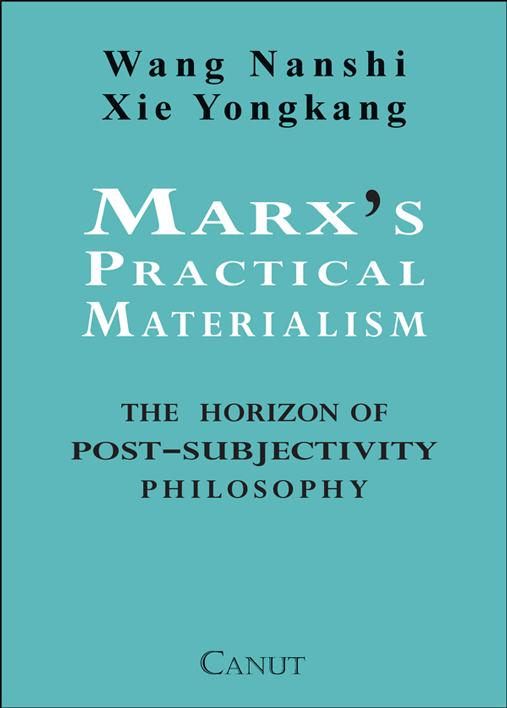Practical materialism
Overview
The debate about whether Marxist philosophy is dialectical materialism or practical materialism has a lot to do with confusing these two different angles and applying practical materialism to the field of ontology.
Whether Marxist philosophy is dialectical materialism or practical materialism is a question of intense debate in Chinese philosophical circles in the 1980s. Today, the discussion continues, and the exchange of views is sometimes fierce. The formation of this situation cannot only be explained by the interest of philosophers. Its underlying reason is related to the market economy increasingly replacing the planned economy, a major change since China's social reform and opening up. In addition, it should be said that insufficient research on the works of Marx and Engels is also one of the important reasons.
The main basis of dialectical materialism is the works of Engels in the middle and late period, while the practical materialism is mainly based on the early works of Marx. This situation not only made the problem unresolved for a long time, but also caused the split and even opposition of Marx and Engels' philosophical thinking. To clarify the thoughts of Marx and Engels on dialectical materialism and practical materialism in a comprehensive way, and then to scientifically reveal the ideological relationship between these two philosophers is a very complicated task. Finished within.
The purpose of this article is to briefly examine Marx’s thoughts on dialectical materialism and practical materialism, in order to deepen the understanding of Marx’s philosophical thoughts, and to promote this kind of dialectical materialism that has lasted for more than 20 years. Discussion on the relationship between ism and practical materialism.
Dialectical Materialism
Marx’s Dialectical Materialism Thought
According to the common understanding in academia, as a philosophical theory, the basic characteristics of dialectical materialism are The realization of the combination of materialism and dialectics is the use of the dialectical movement of matter to explain the scientific world outlook of the entire world.
Does Marx have dialectical materialism? Many practical materialists answered in the negative, and emphasized that Marx advocates observing everything from the perspective of human and human subjectivity and practice. It is impossible to explain the world with the movement of material nature, and it is impossible to have dialectical materialism. The dialectical materialist answered the question in the affirmative, and suffered from not being able to find a direct discourse on dialectical materialism from Marx, and the relevant discourses were all by Engels. In fact, Marx has dialectical materialism. This is not only because Marx supported Engels’ research on dialectics of nature, and agreed with Engels’s "Anti-Duhring Theory", which focused on the dialectical materialist worldview, but more importantly, Marx had his own discourse on dialectical materialism; he and Engels Similarly, the concept of "dialectical materialism" is not used.
In Marx’s "Manuscript of Economics and Philosophy in 1844", there is a complete discourse on the dialectical materialist worldview:
Any existence can only stand on its feet At the time, it considers itself to be independent, and only when it exists on its own, does it stand on its own feet. A person who lives by the grace of others sees himself as a subordinate being. However, if I not only rely on others to maintain my life, but they also create my life, and others are the source of my life, then I rely solely on the grace of others to make a living; if my life is not my own creation, Then my life must have such a root outside of myself. Therefore, creation is a concept that is difficult to exclude from the consciousness of the people. The existence of nature and man through its own is incomprehensible to the consciousness of the people, because this existence contradicts all the obvious facts of actual life.
At first it seems to be saying that man exists by himself, he does not rely on the grace of others, and he is the source of his own life; in fact, Marx is saying that "the natural world and man "The existence of" means that people and nature are the products of self-creation and are always in self-creation. They live on themselves. Marx denies that there is a creator outside nature and man, such as God, and Hegel's absolute concept.
This understanding seems a bit far-fetched, let's look at the following. Marx said immediately after the above paragraph:
The theory of creation of the earth has been fatally hit by the science of earth tectonics, which shows that the formation and generation of the earth is a process and a self-produced science. The spontaneous generation theory is the only practical refutation of the creation theory.
Obviously, this is a specific explanation of "the existence of nature and human beings through themselves" by taking the natural world as an example. This explanation is very similar to the argument in Engels' Dialectics of Nature, which has been criticized by critics of dialectical materialism. They are all based on the achievements of natural sciences, using the dialectical movement of the material nature itself to explain its history and current situation, which is undoubtedly a dialectical materialist view of nature.
After this passage, Marx turned his attention to people. He borrowed the words of Aristotle to point out that the copulation of two people is the kind of behavior of people that produces people. In other words, the physical existence of human beings should also be attributed to human beings. Then, in response to those who questioned the question of "who gave birth to the first person" since everyone was born before him, Marx said: "You should also keep a close eye on that in this infinite process. It can be cyclically moved through perception. Because of this movement, human beings reappear through childbearing, so human beings are always the subject."

Marx believes that man produces himself and man is always the subject. This mainly involves the production of human flesh. In addition, Marx emphasized the sociality of human beings, and social people are also his own products and the products of his own labor:
For socialist people, the entire so-called world history is nothing more than The process by which man is born through human labor is the process of being born by nature to man. Therefore, he has an intuitive and irrefutable proof of his birth through himself and the process of his formation.
Marx once said: "Communism is the active sublation of private property, that is, the self-alienation of human beings, and therefore the real appropriation of human nature through and for humans." From Marx's on communism The argument can be known that the "human being born through human labor" refers to the human nature after overcoming private property and related alienation, including human social nature, returning to human beings, and human beings becoming real people. According to Marx, this is "the end of the prehistoric period of human society" and the beginning of a true human history.
The production of human flesh and the production of society must be based on the existence of the human species. Then, how does the human being as a species come into being? In "German Ideology", Marx said when talking about the transformation effect of labor production on the material nature:
In this case, the priority of the external nature will still be maintained, and of course the whole point is It does not apply to people who are primitive and produced through natural pathways.
This is a familiar sentence, but in the past, in order to emphasize the materiality of the world, everyone only paid attention to the first half of it. In fact, the second half is also very important because it answers how people as a species are Produced-it is "produced through natural pathways." In other words, Marx believes that the human species is also a product of the self-movement of the material nature when human practical activities do not yet exist. In other words, the "natural generation theory" mentioned earlier also applies to humans. Man is the product of self-movement in material nature, and he himself is a natural thing. The conclusion drawn from this one step further is that, in a broad sense, the production of human beings and the production of human society can be regarded as material self-movements just like nature.
To sum up, we can see that based on natural science, Marx first explained that the natural world is a process of self-generation and self-existence, and then explained that the human species, the human body, and overcome alienation and thus possess the true nature of human nature People are also the products of nature and the self-production of these natural objects. These expositions are just the specific explanation of the "natural and human existence through oneself" mentioned above. In other words, Marx actually expounded a complete worldview. According to this world view, there is no creator in the world, and everything is material self-movement; the nature and people in front of us are the products of nature and human self-movement. It should be said that this is what we usually call the dialectical materialist worldview, and its expression lacks its own unique concepts, and is not clear and accurate enough.
Everyone knows that among Western Marxists, the reason why Marx and Engels’ philosophical thoughts are opposed is because they have always emphasized that dialectical materialism applies dialectics to the natural world and uses material natural The dialectical movement explains everything, this is only Engels's thought, Marx did not and cannot have the dialectics of nature. And Marx’s above statement tells us that he has the thought of dialectics of nature. The late philosopher He Lin believed that Marx not only had the thought of dialectics of nature, but that such thought had already existed in the "Doctoral Dissertation". He said: In his "Doctoral Dissertation", Marx "further demonstrated that Epicurus developed Democritus's atomism based on a large number of materials, and included new factors that emphasize moral practice, free will and atheism. This is powerful. It refutes the wrong view that some modern foreign philosophers say, "Only Engels has dialectics of nature, but Marx does not have the wrong view."
Practical materialism
Marx is a practical materialist
Marx has dialectical materialism, but it is not accurate to summarize his philosophical thoughts with dialectical materialism Because Marx’s unique and most valuable philosophy is not dialectical materialism, but practical materialism. More precisely, he is a practical materialist.
On this point, the most important thing is reflected in the first article of Marx’s "Outline on Feuerbach":
All previous materialism (including Feuerbach’s The main shortcoming of materialism is that the object, reality, and sensibility are only understood from the object or intuitive form, rather than as perceptual human activities, as practice, not from the subject. .
The "all previous materialisms" criticized by Marx were not because they did not understand dialectics and did not know how to view the world from the perspective of connection and development, but because they had problems with the perspective of observing the world. Specifically, it is because they only know to explain the world from the material, not from the subjectivity and practical activities of human beings. Objectively speaking, our dialectical materialism today is also among Marx's criticisms. Such materialism Marx would not agree with it.
In fact, the difference between Marx’s philosophical thinking and other materialist philosophies is indeed a different starting point for observing the world, that is, Marx interprets the world from people and their practical activities, rather than as an objective law. Of dialectics. As a materialist, Marx recognizes the dialectical movement of nature itself, but there are very few relevant discussions. Even when it comes to material nature and its movement, Marx always looks at it from the perspective of man. For example, in his "Doctoral Dissertation" he examined the difference between Heraclitus’s and Epicurean’s atomic thoughts, and highly praised Epicurus’s theory of atomic deflection, but his purpose was not to establish a materialism. The view of nature is to affirm the importance of contingency by affirming the deflection of the orbit of the atomic motion, and affirm the "activity" of the atom. Marx believes that Democritus advocates "real possibility", and Epicurus advocates "abstract possibility": "The real possibility is restricted to strict limits like the intellectual; while the abstract possibility is Like fantasy, there is no limit. Real possibility strives to prove the inevitability and reality of its object; while abstract possibility involves not the object to be explained, but the subject of the explanation. What is possible in abstraction can be imagined Things will not hinder the subject of the thinker, nor will it become the boundary of this subject, and will not become an obstacle." Marx said: "The principle of Epicurean philosophy...this is the absoluteness and freedom of self-consciousness. Although this self-consciousness is only understood in the form of individuality." After all, Marx praised Epicurus because he saw the affirmation of self-consciousness in Epicurus' philosophy.
Another example, in "Manuscripts of Economics and Philosophy in 1844", Marx put forward his own dialectical materialism, affirming that the natural world does not depend on human self-movement, but he also put forward: For people, the entire so-called world history is nothing more than the process by which people are born through human labor, and it is the "generating process of nature for man." It can be seen that, as a socialist, what Marx values is not a movement that has nothing to do with nature, but its "generating process for man." Marx also understood the entire dialectics from a human perspective. He said: "The greatness of Hegel's "Phenomenology" and its final result-dialectics, as a driving principle and the negativity of the creative principle-is that Hegel regards human self-generation as a process. ."
As another example, man is undoubtedly the product of natural movement, but Marx just emphasized the difference between man and the natural world outside of man. What he cares about is after the birth of mankind and the practice of man The natural world within sight. After talking about the difference between seeing nature as a product of human practical activities and looking at the nature before us from the movement of nature that has nothing to do with man, Marx said:
This kind of difference can only be seen as a human being. It only makes sense when it is something different from the natural world. In addition, the natural world that existed before human history is not the natural world in which Feuerbach lived; it no longer exists anywhere today except for some newly emerged coral islands in Australia, and therefore for Feuerbach It is also non-existent in nature.
Because of this, when Marx criticized Hegel’s philosophy of nature, he said: "It is understood abstractly, for its own sake, and determined to be the natural world separated from man. For man It is also nothing."
Marx not only observes the world from the perspective of man, but also emphasizes that the relationship between man and the world is a practical relationship. This can be seen very clearly from the first article of "The Outline of Feuerbach". Although Engels once called the "Outline on Feuerbach" "the first document containing the budding genius of a new worldview", in this "Outline", Marx only emphasized the practical relationship between man and the world, and did not talk about it at all. Dialectics of Nature.
In discussions about practical materialism, those who support it often quote the expression in "German Ideology": "For the practical materialist, that is, the communist, the whole problem lies in the use of The existing world is revolutionized, actually opposing and changing existing things." As Marx and Engels considered their philosophical thoughts to be proof of practical materialism, their understanding of this sentence has caused countless controversies. The philosophers who advocate dialectical materialism emphasized that the certain term "practical" describes "materialism" rather than "materialism". Marx, graciousness
Latest: Shen Da Expressway







